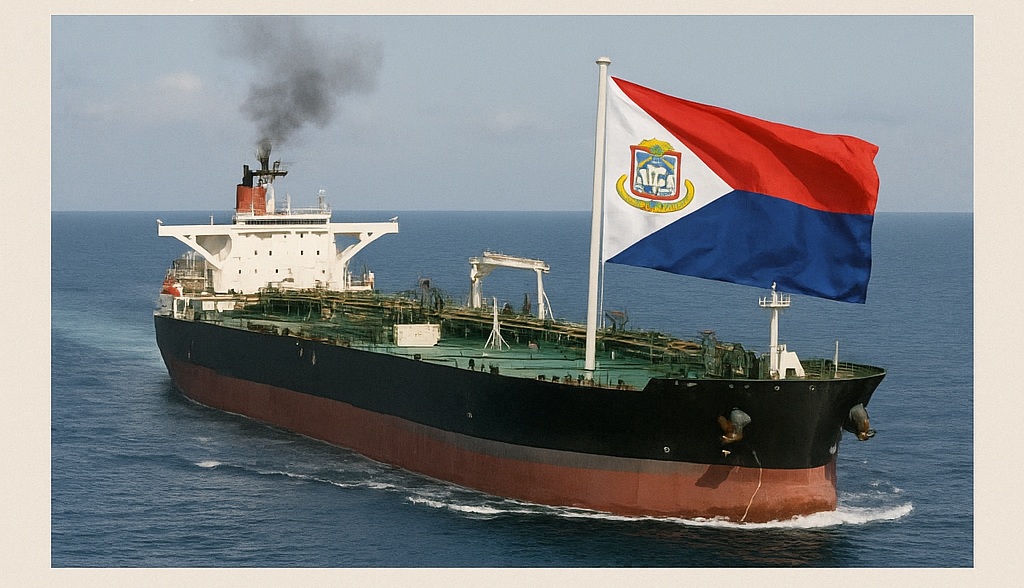
PHILIPSBURG — Sailing under a false flag is becoming a bad habit, these days designed to help Russian and Iranian oil tankers and gas carriers to circumvent sanctions. False flags are nothing new: the term first surfaced in the 16th century. A that time it simply indicated misrepresentation of someone’s allegiance. False flags were used in warfare as well, but now the practice has shifted to merchant vessels like oil tankers. The flag of St. Maarten is alarmingly frequently abused for this purpose, as an investigation by the Dutch investigative platform Follow the Money (and others) revealed recently.
Shipping companies that are hit with sanctions and therefore cannot continue with their regular operations have turned to companies that offer fake shipping registries. Follow the Money found two such companies: the Maritime Administration of the Mathew Island and the International Maritime Registries and Regulatory Inc, which poses as the (non-existent) shipping registry of St. Maarten.
The Maritime Administration of Mathew Island is a joke. The island is an uninhabited rock in the southern Pacific, east of New Caledonia. Nobody lives there and, obviously, that shipping registry does not exist either.
International Maritime Registries and Regulatory Inc operates under the name Maritime Safety and Technical Administration (MSTA). It is based in Beverly Hills, California – an indication that there is plenty of money to be made with shipping registries.
How many merchant vessels are sailing using a false flag is not entirely clear. The International Maritime Organization (IMO) says that there are more than one hundred such vessels in its database.
Another source, the knowledge base windward.ai, examined 540 oil tankers and gas carriers that were identified by the New York-based non-governmental organization United Against Nuclear Iran. They found that 40 percent (or 216) of these vessels are using a false flag.
Follow the Money found that MSTA sold 77 fake registrations and that 19 of them used the flag of St. Maarten. But comsuregroup.com reports that MSTA sold at least 77 false St. Maarten flags and shipping registrations.
With so much information publicly available, one would think that by now MSTA has disappeared from the scene, but the contrary is true. Its website is still there. In rather boisterous language, MSTA profiles itself as a team with an “excellent expertise and reputation within the international maritime and related business community.” For good measure they added: “Our continual growth in expertise in the field of vessel registration has made us a sincere and friendly market leader.”
The website is full of this type of language, designed to make visitors believe they are dealing with a solid company. But the claims become awkward: MSTA states that it is “working exclusively” for St. Maarten maritime for all of its maritime and technical and regulatory services worldwide and that it is “fully committed to the safety and security of St. Maarten flagged vessels, marine environment and its personnel on board or ashore.”
If all of this were true it would be reassuring. But it isn’t, because there is no shipping registry in St. Maarten. That little detail does not seem of any concern to the people who run MSTA. Their website still contains information under the headline Guidance for St. Maarten flagged vessels.
This guidance appears with the coat of arms of St. Maarten under the heading St. Maarten Island. Under the coat of arms is the text Maritime Administration.
Then the website sounds the alarm, stating that there have been more than 300 piracy attacks on commercial vessels in the Gulf of Aden and in the Indian Ocean: “We at St. Maarten Maritime Administration will be very much concerned about the safety of the crew of St. Maarten vessels operating in the affected waters.”
MSTA continues with a warning that ship owners “will have an active role in ensuring self-protection.” The website hints at hiring armored security team and adds some advice about insurance, knowing darn well that ships sailing under a false flag cannot be insured.
False flags in the global merchant fleet came to the attention of the International Maritime Law Institute and the World Maritime University during a symposium in London in March 2020. Reports about the symposium even appeared on Facebook. Almost five years later, in December 2024, the Daily Herald published a report about the false flag-practices.
More recently, it has caught the attention of politicians in the Netherlands who seem to be worried about the damages these false flags (of St. Maarten) are doing to the Kingdom. They questioned the government about it and wanted to know what it is going to do about it.
We are still waiting for answers to these questions but the reaction will be predictable. There is nothing the Dutch government can do (apart from making a lot of noise) to stop a company in California from registering tankers that want to circumvent sanctions under the fake flag of St. Maarten.
And St. Maarten can do nothing at all about it, apart from, as Paul G. Ellinger, an inspector for St. Maarten’s Shipping and Maritime Inspectorate, told StMaartenNews.com, saying: “The inspectorate is taking this seriously. It is tarnishing the country’s name.”
###
ADVERTISEMENT














